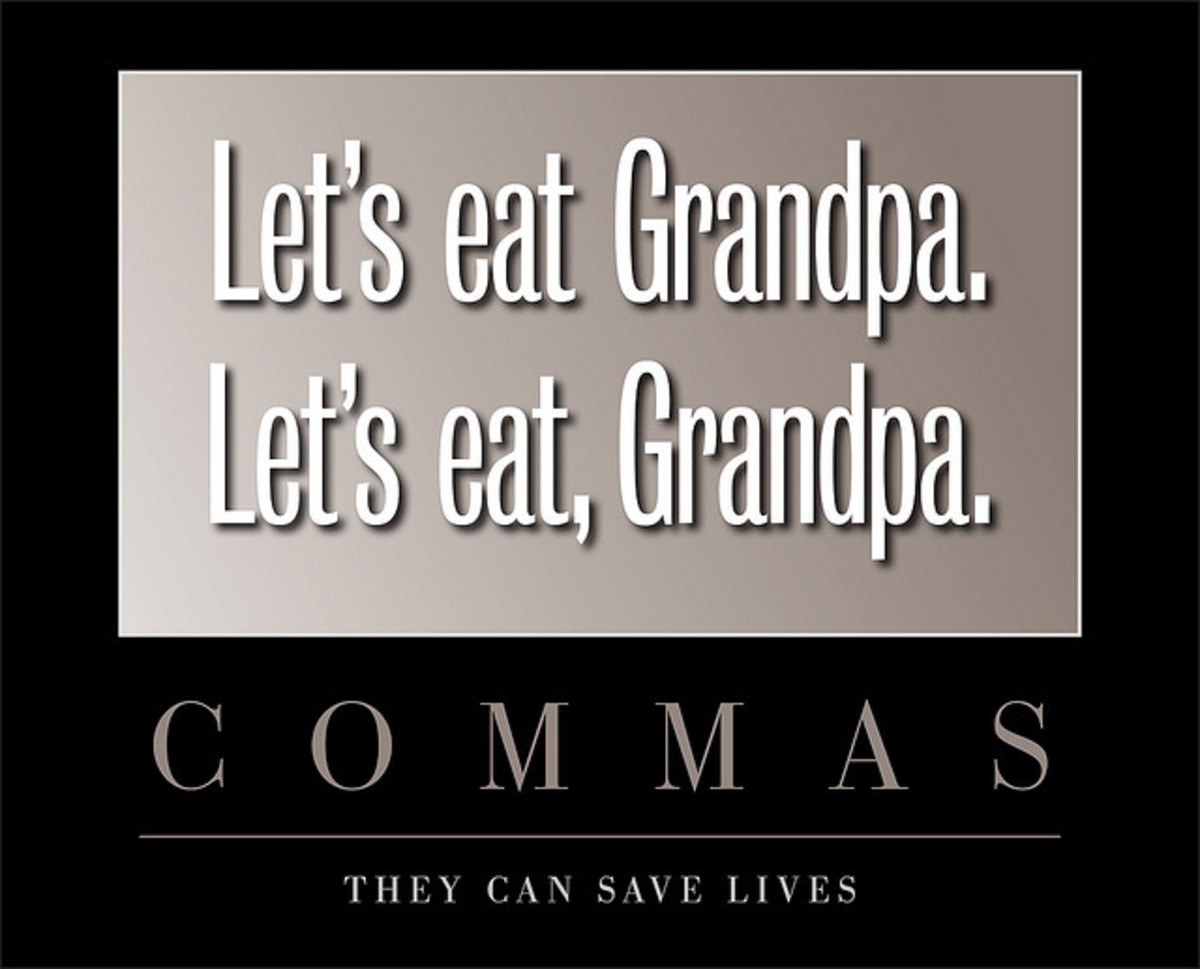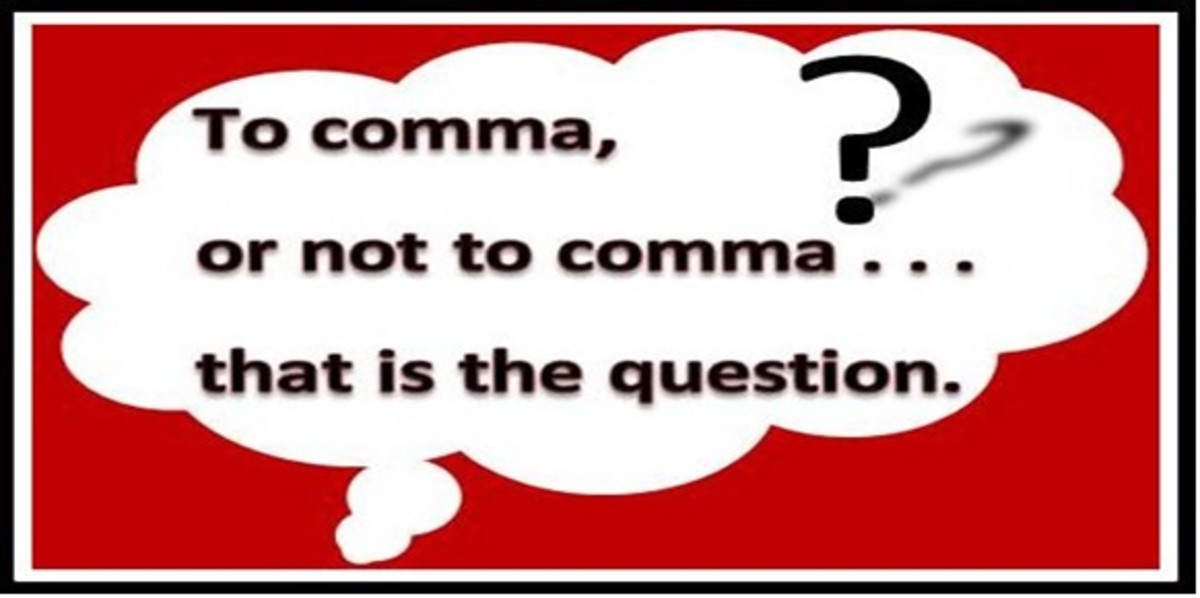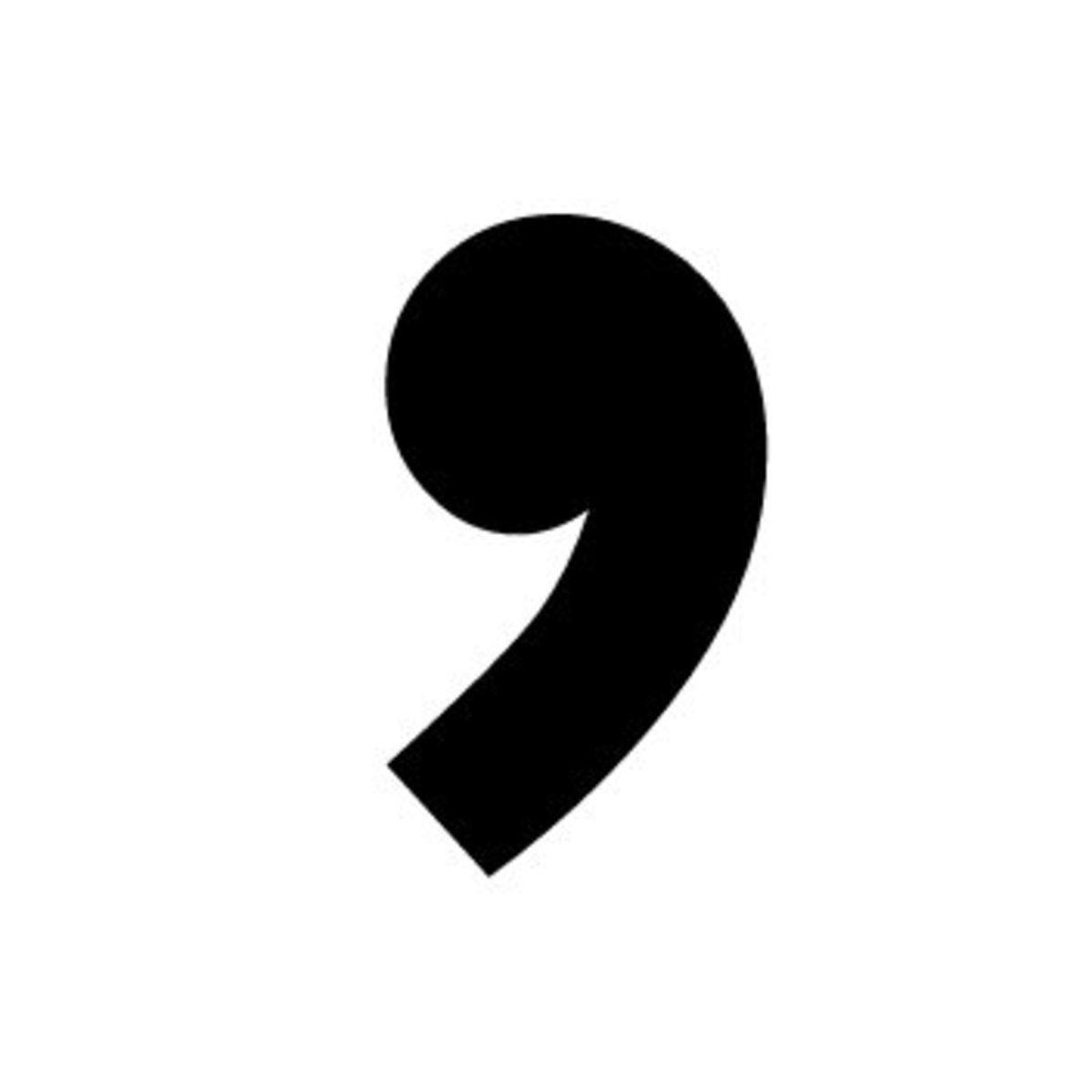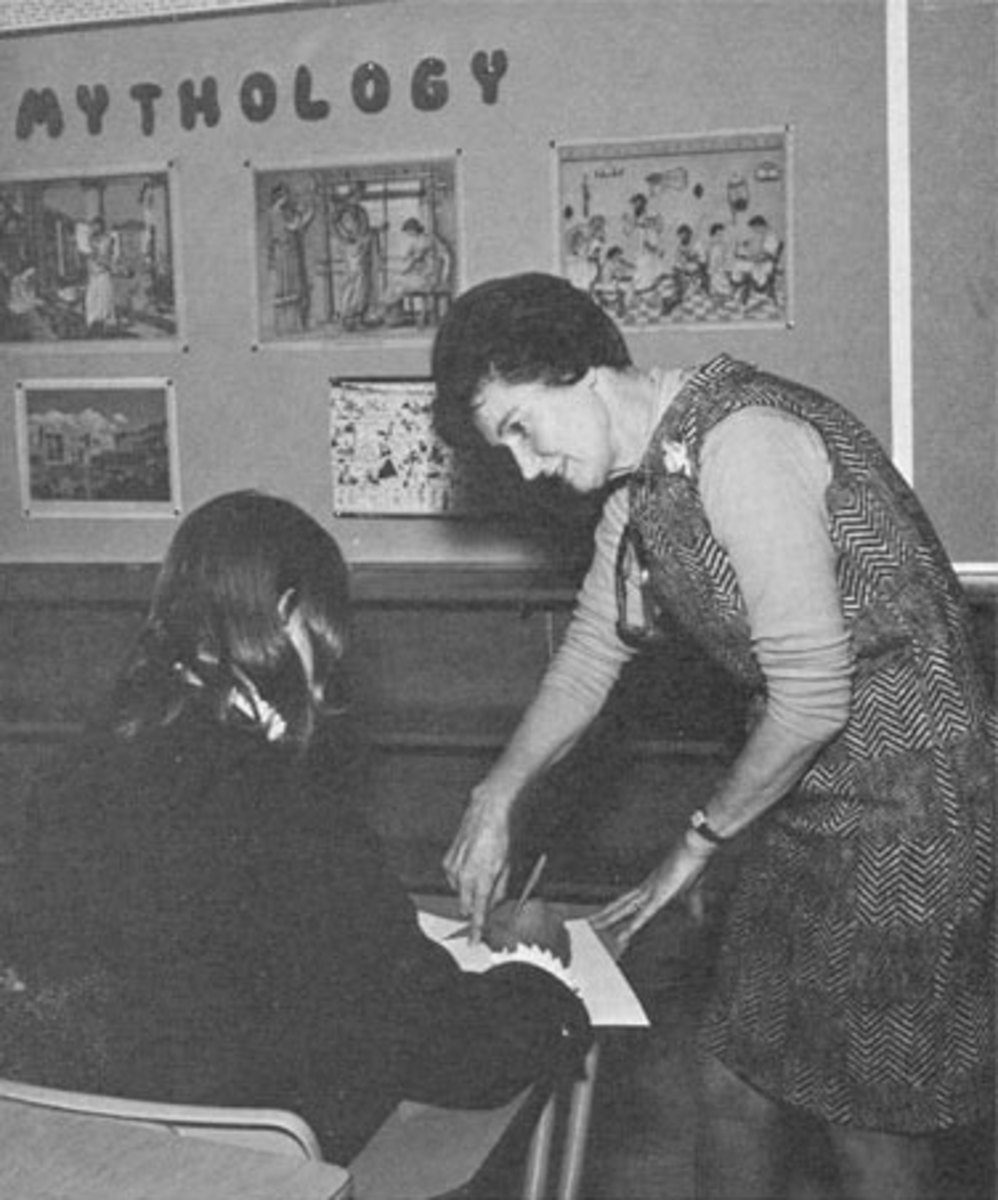- HubPages»
- Books, Literature, and Writing»
- Commercial & Creative Writing»
- Word Usage & Grammar
Comma Usage

Where does the comma go?
The primary purpose of the comma is to clarify and highlight the grammar in a sentence. In plain language, that means to keep a sentence from being misread. However, many heated arguments have ensued over the other purpose of a comma, which is often to keep "time" in the musical score of a sentence. To pause or not to pause? That is the question. These are the times that try editor's souls. Every writer and editor has a different meter: a different sense of how the tempo of a sentence should run --or lag.
In the first section I will outline for you the tried and true rules of comma usage that you would do well to practice consistently. In the second section, I will point out the amusing theological and cultural ramifications of the comma and show you that you, too, can get riled up over punctuation.
Constitution of Comma Usage
The common uses for the comma are:
1. Separating items in a list.
Adjectives:
He was a tall, broad-shouldered, hardworking, mountain cowboy.
Adverbs:
Slowly, tortuously, fiercely, he pulled himself back into the saddle.
Nouns:
Her favorite flavors are banana, chocolate, coffee, and peanut butter.
Verbs:
After you wash, dry, and put away the dishes, come over here and pray with me.
Phrases:
Over the river, through the woods, and under the bridge our sleigh glided like a moonbeam across the snow.
2. Coming before a conjunction when joining independent clauses.
There are very few languages without punctuation, and just as few human faces without eyebrows.
3. Coming after a direct address or interjection.
Joan, I don’t understand the expression on your face.
4. Separating the city from the state in an address.
Boston, Massachusetts
Corralling Comma Usage
5. Separating “parenthetic” phrases from the main part of the sentence to show which parts of the sentence are essential and which are modifying phrases or "add-ons" (the key here is to imagine the commas are parentheses around the “add-on" phrases). Take off the comma that would be at the beginning or end of the sentence when the add-on phrase comes at the beginning or end of the sentence.
I stepped outside, before the dew began to glisten on the grass, to see what had happened in the night. (Modifying phrase is in the middle of the sentence, corralled by commas.)
In the dim and frosty morning, it was hard to discern shadow from figure. (Modifying phrase is at the beginning of the sentence, and uses just one comma to separate it from the the main part of the sentence, the base clause.)
A pile of dark fur was heaped in the meadow, just before the entrance of the trees. (Modifying phrase is at the end of the sentence after the base clause, separated by a comma.)
Most misuses of the comma happen when the parenthetic comma jumps in too soon. Never, never put the comma between subject and predicate unless you have a valid parenthetic phrase to corral with your commas. An example of what NOT to do:
From across the room I could barely see, the bookshelf shift outward.
Her purse, was made of green leather.
6. Commas also take the place of a missing word in a phrase.
I was cold; Martin, hungry. (The comma takes the place of “was” in the second half of the sentence.)
Commaunion

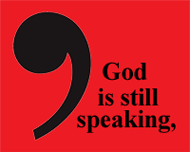
Bill of Rights of Comma Usage
Without the comma, our language would be babble. As Lynne Truss points out in her book, Eats, Shoots & Leaves, the doctrinal validity of purgatory hangs on the indecision of a comma:
I tell you this day, you shall be with Me in paradise.
I tell you, this day you shall be with Me in paradise.
Unfortunately, as in the example above, there is no hard and fast rule in Greek or English that decides where that comma should go. Contextual interpretation and consistency in doctrine of the Scriptures is how protestant Bible scholars have established that the thief joined Christ in heaven on the very same day that Christ spoke the words.
Several churches of the UCC denomination have banded together to engage in the important sacrament of communion. Excuse me, that should have been commaunion. They believe the revelation of God is still open. According to their beliefs, there is no period at the end of the Scriptures, but God ended with the hesitant, finite, little comma,
Commandeering
On a less-spiritual note, editors and writers bicker playfully over the number of commas that should appear in a piece of writing. Some are agog at Viginia Woolf's hovering phrases that never, quite, land.
"Indoors among ordinary things, the cupboard, the table, the window-sill with its geraniums, suddenly the outline of the landlady, bending to remove the cloth, becomes soft with light, an adorable emblem which only the recollection of cold human contacts forbids us to embrace." Mrs. Dalloway, p. 58.
Or Dickens, in Martin Chuzzlewit:
"It is a notable circumstance that in these later times, many Chuzzlewits, being unsuccessful in other pursuits, have, without the smallest rational hope of enriching themselves, or any conceivable reason, set up as coal merchants; and have, month after month, continued gloomily to watch a small stock of coals, without in any one instance negotiating with a purchaser." ch. 1, p. 2.
James Thurber's editor, Harold Ross, was officially dubbed the Comma King because of his belief that adding a few more commas to a sentence would always clarify the sentence. Thurber believed such commas were as much clutter as folding chairs strewn about the clear hallway of understanding and even went so far as to declare "red white and blue" the best way to hoist the colors if Ross preferred "red, white, and blue." Thurber insisted that the less commas there were, the better. (The Years with Ross, by James Thurber, cited in Eats, Shoots & Leaves, by Lynne Truss.)
Many comma arguments come about through trying to make a sentence as clear as it can possibly be in one grammatical sense, while having to ignore another grammatical sense in order to not do "too many" commas. For example:
Come to my house, and if you're not too tired stay for dinner. (The proper use of the comma & conjunction pair used to join to independent clauses.)
Come to my house and, if you're not too tired, stay for dinner. (The proper use of the comma surrounding the "extra" modifying phrase, "if you're not too tired.")
Come to my house, and, if you're not too tired, stay for dinner. (What Dickens would do: proper grammar all around, and almost enough commas to break the camel's back.)
The vogue in recent literature is to drop commas and shorten sentences. Brevity, concision, and a trim-and-timely step is required if you want to get or keep readers. I'm not even sure if a fragment is a bad thing anymore; in fact, I've seen many a one-word sentence that is not composed of the allowable "Hello" or "Oh," and I've seen almost just as many one-word paragraphs. However, an intricate or elegantly complex sentence such as our founding fathers used in both their personal letters and political documents is considered hopelessly archaic, a decaying whiff of the past.
Commabalism
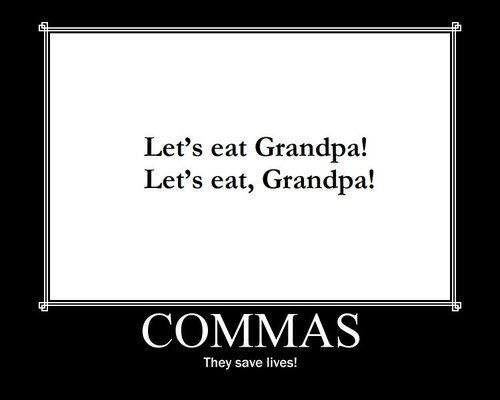
Momma Comma
Sweet and submissive commahood is about as rare these days as sweet and submissive womanhood. The period has a noble duty-- he must bring home the bacon at the end of the sentence. His unruly children, those "add-on" modifying phrases, need a comma's gentle touch and order. Our culture and our prose lacks the momma who is willing to do her duty to both her children and her husband, nobly bending to the will of her master while coaching and encouraging him to the end.
Lynne Truss's final rule in regard to comma usage deserves a duplicate here: "Don't use commas like a stupid person." What she means (if an explanation is required) is that you must realize that a comma in a particular place will give a certain meaning to your sentence, and a comma in another particular place will give a different sort of meaning to your sentence. Don't use a comma "stupidly:" getting the meaning you didn't want instead of the one you did.
Choose for yourself this day whom you will serve. The Catholic comma? (Choose for yourself this day, whom you will serve.) The United Church of Christ comma? (Choose for yourself this day whom you will serve, ...etc.) Or the traditional, Dickensian, founding-fathers' comma of tact, elegance, and grammatical victory?
© 2010 Jane Grey


